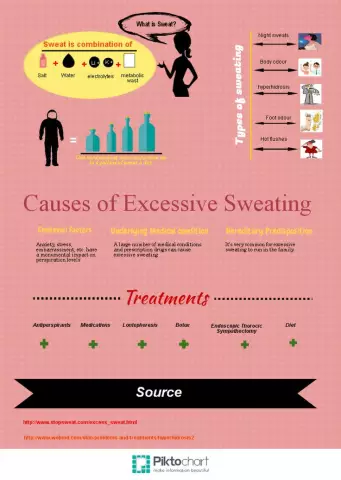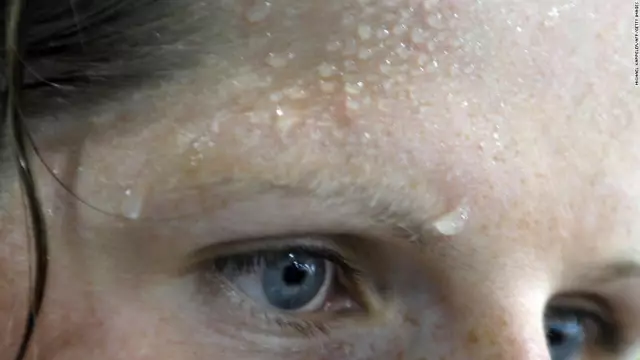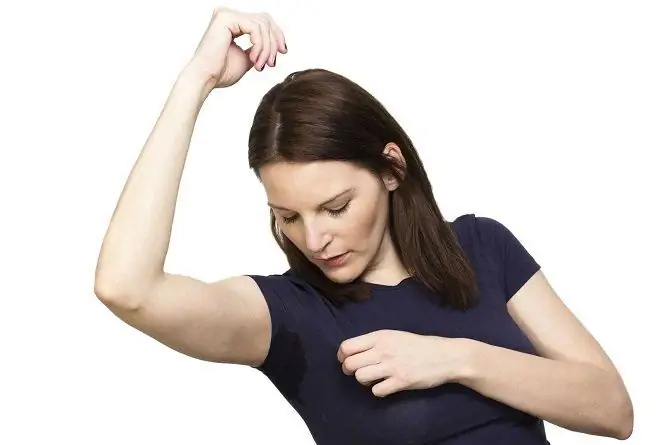- Author Rachel Wainwright wainwright@abchealthonline.com.
- Public 2023-12-15 07:39.
- Last modified 2025-11-02 20:14.
5 conditions signaled by excessive sweating
Sweating has a vital role in protecting the body from overheating. Sweat glands are located over the entire surface of the body, their work is regulated by the sympathetic division of the autonomic nervous system. The intensity of the normal secretion of fluid by the sweat glands varies from person to person. Therefore, excessive sweating (hyperhidrosis) is spoken of only in cases where profuse sweating causes constant discomfort, which significantly reduces the quality of life.
Today we will talk about those conditions that cause hyperhidrosis.
Changes in the level of female sex hormones
Hyperhidrosis is often one of the manifestations of climacteric syndrome. The woman periodically experiences hot flashes in the face, neck and upper chest, accompanied by increased heart rate and sweating. This can happen at any time of the day or night. If the seizures occur no more than 20 times a day, the situation is considered normal and does not require medical intervention. When other unpleasant symptoms join hyperhidrosis (pain in the head or chest, increased blood pressure, numbness of the hands, urinary incontinence, dry mucous membranes, etc.), a woman should consult a gynecologist regarding compensatory therapy.
Excessive sweating of the whole body is typical for the first two trimesters of pregnancy. It occurs against the background of hormonal changes and is considered normal. Hyperhidrosis in the third trimester is associated with an acceleration of metabolism, accumulation of large amounts of fluid in the body, or weight gain. Alarming signs may be an ammoniacal smell of sweat and white marks on clothing, indicating kidney problems.

Source: depositphotos.com
Thyroid pathology
Hyperhidrosis is one of the symptoms of abnormally high production of thyroid hormones (hyperthyroidism). It occurs with the following diseases:
- nodular toxic goiter;
- Graves' disease (diffuse goiter);
- subacute thyroiditis.
Excessive sweating caused by malfunctioning of the thyroid gland sometimes manifests itself with pituitary tumors. If hyperhidrosis is combined with a sharp weight loss against the background of increased appetite, hand tremors, heart rhythm disturbances, irritability and anxiety, it is necessary to urgently consult an endocrinologist.

Source: depositphotos.com
Fluctuations in blood glucose
Excessive sweating often occurs with diabetes mellitus. In this case, it is associated with a violation of thermoregulation. Diabetes of any type leads to the destruction of nerve endings, as a result of which it becomes impossible to adequately transmit signals to the sweat glands. In diabetics, hyperhidrosis predominantly affects the upper half of the body: face, neck, chest and abdomen. Characterized by increased fluid secretion at night.
Hyperhidrosis may also indicate insufficient blood glucose (hypoglycemia). In diabetic patients, the cause of the problem is usually a violation of the diet or an overdose of hypoglycemic drugs. Healthy people sometimes lack glucose after strenuous exercise. In hypoglycemia, cold, clammy sweat appears mainly on the back of the head and the back of the neck. The attack may be accompanied by dizziness, nausea, tremors, and blurred vision. To quickly get rid of the ailment, you need to eat something sweet (banana, candy, etc.).

Source: depositphotos.com
Heart and vascular problems
Almost all diseases of the cardiovascular system are accompanied to one degree or another by hyperhidrosis. Increased sweating is inherent in the following pathologies:
- hypertonic disease;
- atherosclerosis;
- obliterating endarteritis;
- angina pectoris;
- transient ischemic attack;
- vascular thrombosis.
In addition, sweat glands with increased stress work in people with pericarditis or myocarditis.

Source: depositphotos.com
Powerful emotions
In a stressful situation, metabolism accelerates - this is how the body is mobilized. With strong emotions (both positive and negative), shock doses of the hormones norepinephrine and adrenaline are released into the blood. Increased sweating is one of the consequences of these processes.
Emotional, or stressful, hyperhidrosis affects primarily the sweat glands located on the feet, palms, face and armpits. Scientists believe that sweating of the feet and palms under stress is a manifestation of an ancient biological mechanism that provided our distant ancestors with optimal grip of the soles with the surface during flight. Another version is associated with the concept of non-verbal (olfactory) communication methods used by all warm-blooded animals. In this case, we are talking about the secretion of a liquid by the body that has a pungent odor and signals a dangerous situation.

Source: depositphotos.com
In many people, hyperhidrosis occurs when the pain is severe, and the whole body is covered with cold sweat.
In people without serious health problems, excessive sweating is the result of eating certain foods. Hyperhidrosis can be caused by coffee, chocolate, hot spices, garlic, soda, alcohol, and food containing homogenized fats. The intensity of sweating also increases in smokers.
Sweating can be triggered by taking certain medications: antiemetic, antipyretic, pain relievers, antihistamines, sedatives, anticonvulsants and antihypertensive drugs, as well as calcium preparations. The body's reaction to drugs is individual, this also applies to the appearance of such a side effect as sweating.
Hyperhidrosis can be a sign of health problems. If increased sweating significantly affects quality of life or is accompanied by other unpleasant symptoms, you should see a doctor.
YouTube video related to the article:

Maria Kulkes Medical journalist About the author
Education: First Moscow State Medical University named after I. M. Sechenov, specialty "General Medicine".
Found a mistake in the text? Select it and press Ctrl + Enter.






